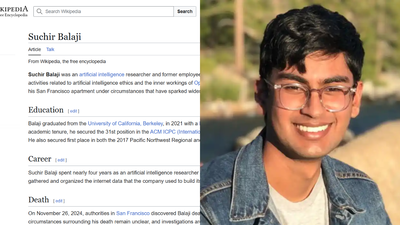
Suchir Balaji’s Wikipedia page paints a compelling, albeit tragic, portrait of a young artificial intelligence researcher whose life and work left a mark on both AI development and ethics. From his early achievements to the controversy surrounding his death, the details offer insight into a brilliant mind and the complexities of working at the forefront of AI.
A Rising Star in AI and Competitive Programming
Balaji’s early years reflect an exceptional talent for computer science and programming. Graduating from the University of California, Berkeley in 2021 with a bachelor’s degree in computer science, he quickly made a name for himself. His academic achievements include securing the 31st position in the ACM ICPC 2018 World Finals, one of the most prestigious competitive programming contests in the world. Notably, Balaji also dominated regional contests, finishing first in both the 2017 Pacific Northwest Regional and Berkeley Programming Contests.
These accolades highlight his sharp problem-solving skills, algorithmic expertise, and a mind attuned to precision—qualities that later defined his work in artificial intelligence research.
Contributions at OpenAI
Balaji spent close to four years working as an artificial intelligence researcher at OpenAI. His contributions included gathering and organizing vast amounts of internet data that became foundational to systems like ChatGPT. This work, while seemingly behind-the-scenes, was integral to building language models capable of interacting in human-like ways.
However, Balaji’s career at OpenAI wasn’t defined solely by technical achievements. As noted on the page, he became a whistleblower, publicly addressing ethical concerns about the inner workings of AI and OpenAI’s practices. While details surrounding his claims remain scarce, they undoubtedly raised important questions about the role of transparency and ethics in the rapidly advancing AI industry.
The Circumstances of His Death
Balaji’s untimely death on November 26, 2024, has added a somber tone to his legacy. Authorities found him in his San Francisco apartment during a wellness check, concluding that the cause was suicide, with **”no evidence of foul play.” **Yet, the surrounding circumstances have fueled speculation, particularly given his whistleblowing activities. Media coverage of his death has prompted public discourse about the pressures faced by researchers and whistleblowers in high-stakes, fast-moving fields like artificial intelligence.
The Broader Impact
Suchir Balaji’s story underscores the often-hidden burdens carried by those shaping the future of technology. While his achievements in AI research and competitive programming remain impressive, his whistleblowing activities and subsequent death raise larger issues about ethics, accountability, and mental health in the tech industry. His life serves as a reminder that progress in technology is inextricably tied to human values—and that those advocating for ethical considerations often face tremendous challenges.
Balaji’s legacy continues to spark conversations not just about AI but about the human beings driving its development, their struggles, and their voices that must not be ignored.






